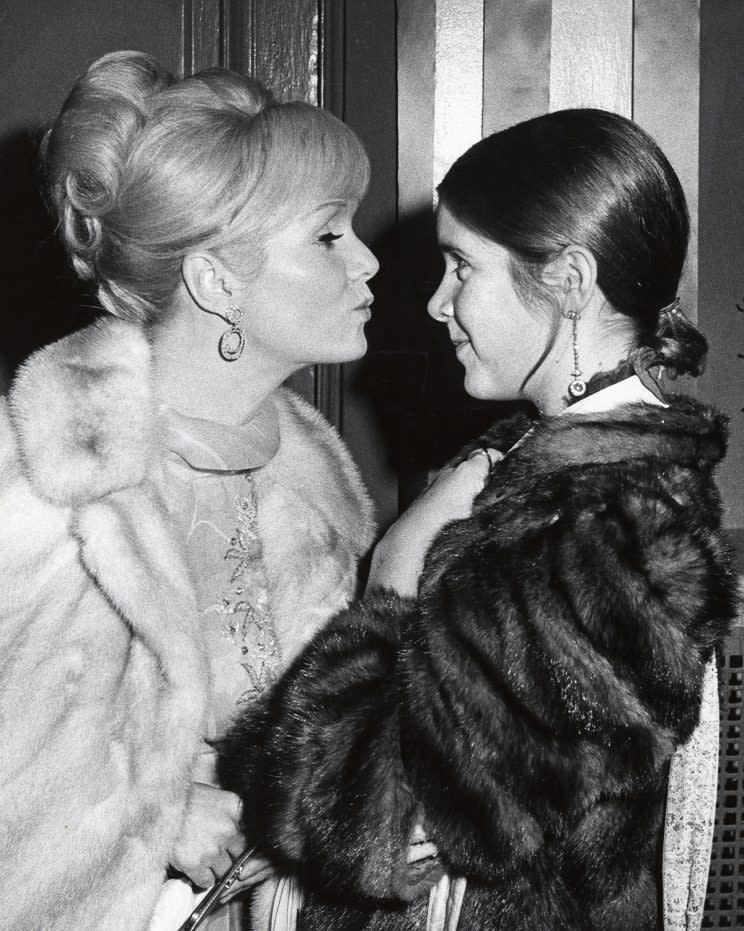Yes, Debbie Reynolds May Have Died of a Broken Heart

While millions of fans are mourning the untimely death of writer, producer, and screen icon Carrie Fisher, her mother, movie legend Debbie Reynolds, passed away on Wednesday — just one day after her daughter died. Reynolds was 84 years old.
“She’s now with Carrie, and we’re all heartbroken,” Todd Fisher — Reynolds’s son and Fisher’s brother — told the Associated Press from Cedars-Sinai Medical Center in Los Angeles. He added that the stress of his sister’s death on Tuesday “was too much” for his mother. “She said, ‘I want to be with Carrie,’” he stated. “And then she was gone.”
On Dec. 27, Reynolds posted a message on her Facebook page to thank her daughter’s fans for their outpouring of support.
Celebrity site TMZ reported that during the early afternoon hours on Dec. 28, Reynolds was rushed to the hospital for a possible stroke. The 911 call was made from someone in her son’s home, where the immediate family had gathered to discuss the funeral arrangements for Fisher.
The back-to-back deaths of Fisher and Reynolds may simply be a heartbreaking coincidence. However, Reynolds’s passing is likely to be the outcome of a broken heart.
“There is certainly a syndrome called broken heart disease,” Jennifer H. Haythe, MD, assistant professor of medicine in the division of cardiology at the Center for Advanced Cardiac Care at Columbia University Medical Center and co-director of the Women’s Center for Cardiovascular Health, tells Yahoo Beauty.
Also referred to as stress-induced cardiomyopathy or takotsubo cardiomyopathy, according to the American Heart Association, Haythe — who did not treat Reynolds — adds that this condition is more prevalent in women and occurs after an unusually emotional event.
“People develop what looks like they’re having a heart attack so their EKG [electrocardiogram, a test that measures the electrical activity of the heartbeat] findings look like they’re having a heart attack,” she continues. “On an echo [echocardiogram], which is an ultrasound of the heart, the heart looks like it’s also having a heart attack, and it balloons out similar to what we see in patients who have congestive heart failure. It looks like an octopus trap, which is how they named it in Japan. [Tako tsubo are octopus traps that resemble the potlike shape of the stricken heart.]
Because patients experience symptoms similar to those of a heart attack (e.g., sudden, intense chest pain), broken heart syndrome can be misdiagnosed as a heart attack. “But it’s actually not a heart attack because when they do a catheterization [also known as a cardiac cath or heart cath, a procedure in which a hollow tube is inserted into a large blood vessel that leads to the heart], there are no blockages of any of the arteries in the heart,” says Haythe.
While all of the facets regarding this syndrome have yet to be determined, Haythe believes that “it probably has something to do with the surge in catecholamines [hormones produced by the adrenal glands as part of the fight-or-flight response] in the stress reaction that people experience, and there’s some interaction between how those catecholamines are released and damage to the heart.”
She further explains that broken heart syndrome can occur in someone without a preexisting cardiovascular condition and can be “completely reversible” using standard remedies for heart disease, including beta-blockers.
The deaths of Reynolds and Fisher come just 13 months after the similar deaths of the parents of former NFL legend Doug Flutie, who both died from heart attacks within one hour of each other.
“The take-home message is there’s clearly an interplay between a person’s emotional state and their overall wellness, particularly with their cardiovascular system,” says Haythe. “Our emotions are connected to our bodies. It’s a continuum — it cannot be separated.
“Even more important, I hope that people recognize that cardiovascular disease really is the No. 1 killer of women, which includes stroke and heart attack,” she says. “Carrie Fisher and her mother are examples of this. Nobody seems to want to recognize that fact because they see it as a man’s disease, but it really isn’t.”
Let’s keep in touch! Follow Yahoo Beauty on Facebook, Twitter, Instagram, and Pinterest.


